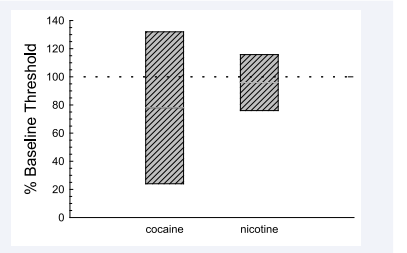Quantitative Comparisons of Brain Reward Function during Nicotine and Cocaine Withdrawal
- 1. Addiction Research Unit, Department of Psychology, USA
CITATION
Bozarth MA (2021) Quantitative Comparisons of Brain Reward Function during Nicotine and Cocaine Withdrawal. J Subst Abuse Alcohol 8(2): 1093.
INTRODUCTION
Considerable attention has been given to the apparent similarities between nicotine’s effects and those of cocaine and other addictive drugs on brain reward systems. These apparent similarities ignore important quantitative differences. Indeed, the effects of nicotine on brain reward systems has been shown consistently to be significantly weaker than the effects produced by prototypic addictive drugs such as cocaine.
Epping-Jordan et al. [1] reported “dramatic decreases in brain reward function during nicotine withdrawal.” The title of their article (quoted in the preceding sentence) aptly illustrates a major problem with much of the research reported in this area-what is considered “dramatic” seems dictated more by a political agenda than by empirical evidence. The threshold elevations reported following nicotine withdrawal are modest not “dramatic” compared to the threshold elevations produced by other experimental manipulations (e.g., neuroleptic treatment). The authors also state that nicotine produces an effect “comparable in magnitude . . . to other major drugs of abuse.” Again, this is incorrect. Their own published work shows that cocaine withdrawal produces about a 100% threshold elevation, [2-3] while nicotine withdrawal produces only about a 40% threshold elevation. The difference in these effects is actually greater than the threshold elevations seen during nicotine withdrawal.
We have also seen threshold elevations following termination of high-dose nicotine administration, but the magnitude of this effect remains substantially less than that seen with cocaine withdrawal. Using an experimental procedure that measures the threshold for rewarding electrical stimulation in laboratory rats, termination of a series of high-dose nicotine injections was shown to elevate thresholds by about 16% [4] while cocaine withdrawal increased thresholds by about 34% [5].Although this effect is much weaker than that reported by Epping-Jordan et al. [1]the difference in threshold elevations produced by cocaine and nicotine withdrawal is about the same—nicotine withdrawal produces about half the magnitude of threshold elevations as that produced by cocaine withdrawal. The differences in absolute magnitudes reported by us [4, 5] and the other research group [1-3] probably result from using different drug administration regimens.
The important quantitative differences are perhaps even better illustrated by considering both the activating and inhibiting effects of these compounds on brain reward systems. The figure shows the maximum threshold lowering [6] and the maximum threshold elevations [4-5] produced by cocaine and nicotine. Threshold reductions are interpreted as indicating activation of brain reward mechanisms and are produced by the direct pharmacological actions of these compounds, while threshold elevations are interpreted as indicating decreased brain reward function and are produced by terminating repeated administration of these compounds. Cocaine administration and withdrawal clearly produce much stronger activating and inhibiting effects, respectively. Similar quantitative differences are seen when comparing the effects of cocaine and nicotine on other putative measures of brain reward system activation, but these data have also been interpreted emphasizing the similarities while ignoring important quantitative differences[7] [Figure 1].
Figure 1: Maximum threshold reductions and elevations produced by substance administration and withdrawal, respectively. Decreased thresholds suggest an activation of brain reward mechanisms, while increased thresholds suggest a reduction of brain reward function. Cocaine clearly produces much stronger reward enhancing and inhibiting effects than nicotine. (Cocaine data are from Bozarth & Pudiak, 1991; nicotine data are from Bozarth & Pudiak, 1998).
Scientists that ignore quantitative comparisons of a compound’s effects on brain reward systems are forgetting a fundamental assumption of this line of research-a major component of the rewarding effects produced by some addictive drugs is believed to derive from their actions on brain reward systems involved in natural rewards and motivation[8-10]The actions of natural rewards on these brain reward systems are not viewed as addictive, and nicotine’s effects on these systems are modest and more similar to natural rewards that to prototypic addictive drugs. Other factors (e.g., nicotine’s interactions with social factors or personality traits) must be important in cases where the motivation for tobacco use exceeds the normal motivations an individual experiences for natural rewards.










































































































































